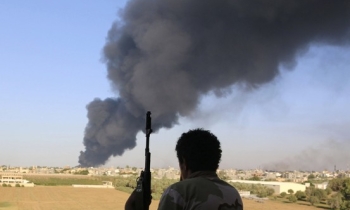More than 400 detainees being held in Iraqi and US-run prisons, including five women, were freed on Thursday in a move which could help free abducted US reporter Jill Carroll.
"We have released 419 detainees today including five women," a spokesman for the US detention facilities in Iraq said.
An Iraqi justice ministry official earlier said a total of 424 detainees were to be freed following a review of their cases by a joint Iraqi-US board, including five of the nine women known to be held by US forces.
Pan-Arab television station Al-Jazeera said last week that the kidnappers of 28-year-old Carroll had threatened to kill her unless all female detainees held by US forces in Iraq were set free.
While Iraqi and US officials have denied that the release has anything to do with Carroll's case, there is hope the move might help her regardless.
Carroll was abducted on January 7 in Baghdad, one of the nearly 250 foreigners seized in Iraq since the March 2003 invasion, in a recent surge in hostage-takings in the violence-wracked country.
"Let me assert that there is no connection between the release and kidnapping of the US reporter. The release was finalised after a review by the Iraqi-US board," the US spokesman said.
The recent spike in hostage-taking of foreigners since late November has embarrassed the government.
"Government services are doing all they can to free people kidnapped and detained," Minister for National Security Abdul Karim al-Anizi said during a meeting with President Jalal Talabani, according to his office.
US and Iraqi forces are searching for two German engineers, Rene Braunlich and Thomas Nilzchke, the most recent kidnap victims, seized at gunpoint on Tuesday by men posing as Iraqi soldiers outside an oil refinery in Baiji, northern Iraq.
"We are trying at the moment to obtain any information possible," German Foreign Minister Frank-Walter Steinmeier said in Berlin, adding that no contact had been established with the captors yet.
A group of Kenyan Muslims is planning to visit Iraq to plead for the release of two Kenyan telecommunications engineers who were abducted last week after their bodyguards were gunned down in Baghdad.
There was also no news on the fate of four Western peace activists seized in November, while the status of a Jordanian hostage is unknown after a videotape from his captors set a new deadline to execute him.
The spate of hostage-taking, which could be politically or simply financially motivated, comes as political parties jockey for position ahead of official talks on forming a broad-based government to rule the country for the next four years.
Washington hopes the new government to be set up in the wake of the December 15 election, will include representatives of the Sunni Arab minority, a move it is hoped will undermine the insurgency.
However, Sunni representatives insisted at a meeting with Shiite leaders Wednesday that moves towards greater federalism should be put on a back-burner as a price of their joining the new government.
"It federalism can be postponed to the next assembly," Sunni leader Salah al-Mutlak said in an interview with AFP.
The Sunnis, dominant under ousted dictator Saddam Hussein, fear that a federal Iraq filled with autonomous zones might rob them of the country's vast oil wealth which is concentrated in the mainly Shiite south and the Kurdish north.
The United Nations also said on Wednesday it was keen to bridge differences over Iraq's post-Saddam constitution.
"We have the experience to bridge the differences and it can be useful," UN representative in Iraq Ashraf Qazi said, adding that a number of political parties, intellectuals and others had called upon the UN to play a constructive role in the new Iraq.
In rebel violence a US soldier was killed and another wounded by a roadside bomb south of Baghdad, the US military said, taking the toll of US casualties in Iraq since the 2003 invasion up to 2,240 according to an AFP count based on Pentagon figures.
On Wednesday five Iraqi soldiers were killed and two wounded in a roadside bomb attack targeting their patrol in Samarra, north of Baghdad, said the Iraqi military.
In the United States, two reviews have highlighted that the country's military was overstretched in Iraq and Afghanistan.
"While the US military has performed superbly in Afghanistan, Iraq and elsewhere, our ground forces are under enormous strain," said the report by the former administration officials under ex-president Bill Clinton.
"This strain, if not soon relieved, will have highly corrosive and potentially long-term effects on the force," they added.
US Defence Secretary Donald Rumsfeld however dismissed the reports.









